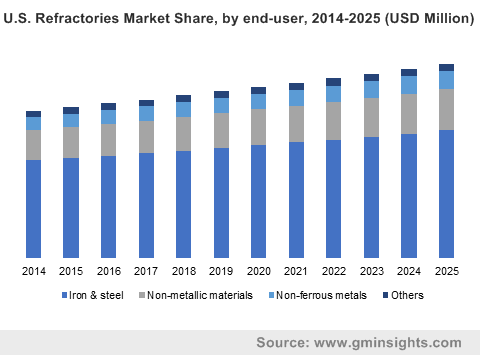Refractories Market size worth over $41 Bn by 2025
Published Date: June 28, 2019
Refractories Market is poised to surpass USD 41 billion by 2025; according to a new research report by Global Market Insights Inc.
Refractories are materials which are composed from thermally stable minerals and a binder phase. They are heterogenous and porous in nature and can withstand extreme temperature in excess of 1,5000C, without undergoing any structural changes while maintaining contact with molten slag and metals. Refractories are extensively used for industrial processes, where they perform various functions such as a barrier for molten slag and the containing medium. They provide physical protection and reduce erosion of surface by keeping the medium circulated. They prevent chemical corrosion and ensure heat retention.
Steel demand in China, which accounts for around 45% of global steel demand, showed significant growth in 2016. In the ASEAN (Association of Southeast Asian Nations) region, steel demand during 2017 recorded slight growth in steel production. Thailand and Vietnam accounts for about 54% of steel demand in ASEAN. Growth in infrastructure sector is likely to rise in Indonesia, the Philippines and Vietnam due to state funded infrastructure projects. With growing infrastructure industry, the demand for refractories will also grow due to their indispensable usage in iron & steel furnace. Emission of particulate matter and volatile organic compounds have detrimental effect on health. This will slow down the growth for refractories market size for the projected time period. However, product recovery cyclone followed by wet scrubbers can effectively limit the emission of particulate matter in the environment. Along with this use of fabric filter and baghouses to control VOCs emission will boost the refractories market for refractories.

Get more details on this report - Request Free Sample PDF
Browse key industry insights spread across 364 pages with 512 market data tables & 27 figures & charts from the report, ” Refractories Market Size By Form (Bricks & Shapes, Monolithic), By Composition (Clay-based, Nonclay-based), By Type (Acidic, Basic, Neutral), By Manufacturing Process (Dry Press Process, Fused Cast, Hand Molded, Formed, Unformed), By End-user (Iron & Steel, Non-metallic Materials, Non-ferrous Metals), Industry Analysis Report, Regional Outlook, Application Growth Potential, Price Trends, Competitive Market Share & Forecast, 2019-2025” in detail along with the table of contents:
https://www.gminsights.com/industry-analysis/refractories-market
Monolithic refractories market is expected to witness gain of 3.9% by 2025. Monolithic are generally called unformed refractories which includes mortars, gunning mixes, castable (refractory concrete), ramming mixes, and plastics. These products are cured in place to form a monolithic, internal structure after application. They are generally used in cement, glass and ceramic industries.
Based on composition, refractories market is segmented into clay-based and nonclay-based. The market size for nonclay-based refractories was over USD 14 billion in 2018. Nonclay based refractories are starting material which includes carbonates or oxides of metals such as zirconium, aluminum and magnesium. They are mostly produced as brick and pressed shapes, though some magnesite-chrome and alumina materials are fuse-cast into molds.
Based on type, refractories market is segmented into acidic, basic, and neutral. The basic segment for refractories is anticipated to gain more than 3.5% by 2025. Basic refractories are harmed by acidic slags, but are stable to dusts, fumes, and alkaline slags at an elevated temperature. They are stable with alkaline slags and thus are preferred for furnace linings in alkaline environment.
Based on manufacturing process, refractories market is segmented into dry press process, fused cast, hand molded, formed, unformed. The dry press process segment was worth USD 7.5 Billion in 2018. This process is usually suitable for formation of simple solid shapes. They are generally suited for clays with very low plasticity. As dry press process is simple and requires low capital equipment costs, they are widely used for high volume forming process for ceramics.
Based on end-user, refractories market is segmented into iron & steel, non-metallic materials, non-ferrous metals and others. The non-ferrous metals segment was worth USD 2.8 Billion in 2018. Middle East & Africa is estimated to grow at 3.6% by 2025. Growing political stability along with massive infrastructure spending in the Middle East & Africa will play a constructive role for the growth of steel industry. This will have a positive impact on the overall refractories market.
Some of the key players in refractories market are RHI Magnesita, Krosaki Harima Corporation, Vesuvius PLC, Shinagawa refractories Co., Ltd., Saint-Gobain, Morgan Advanced Materials, CoorsTek Inc., HarbisonWalker International, Imerys, etc.
Refractories market research report includes in-depth coverage of the industry with estimates & forecast in terms of volume in tons & revenue in USD Thousand from 2014 to 2025, for the following segments:
Refractories Market, Form By End-user
- Bricks & shapes
- Iron & steel
- Non-metallic materials
- Non-ferrous metals
- Others
- Monolithic
- Iron & steel
- Non-metallic materials
- Non-ferrous metals
- Others
- Others
- Iron & steel
- Non-metallic materials
- Non-ferrous metals
- Others
Refractories Market, By Composition
- Clay-based
- Nonclay-based
Refractories Market, By Type
- Acidic
- Basic
- Neutral
Refractories Market, By Manufacturing process
- Dry press process
- Fused cast
- Hand molded
- Formed
- Unformed
Refractories Market, By End-user
- Iron & steel
- Non-metallic materials
- Non-ferrous metals
- Others
The above refractories market information is provided on a regional and country basis for the following:
- North America
- U.S.
- Canada
- Europe
- Germany
- UK
- France
- Spain
- Italy
- Russia
- Turkey
- Asia Pacific
- China
- India
- Japan
- Australia
- South Korea
- Indonesia
- Malaysia
- Latin America
- Brazil
- Mexico
- Argentina
- Middle East & Africa
- South Africa
- Saudi Arabia
- UAE
- Qatar
- Iran
Kiran Pulidindi, Hemant Pandey